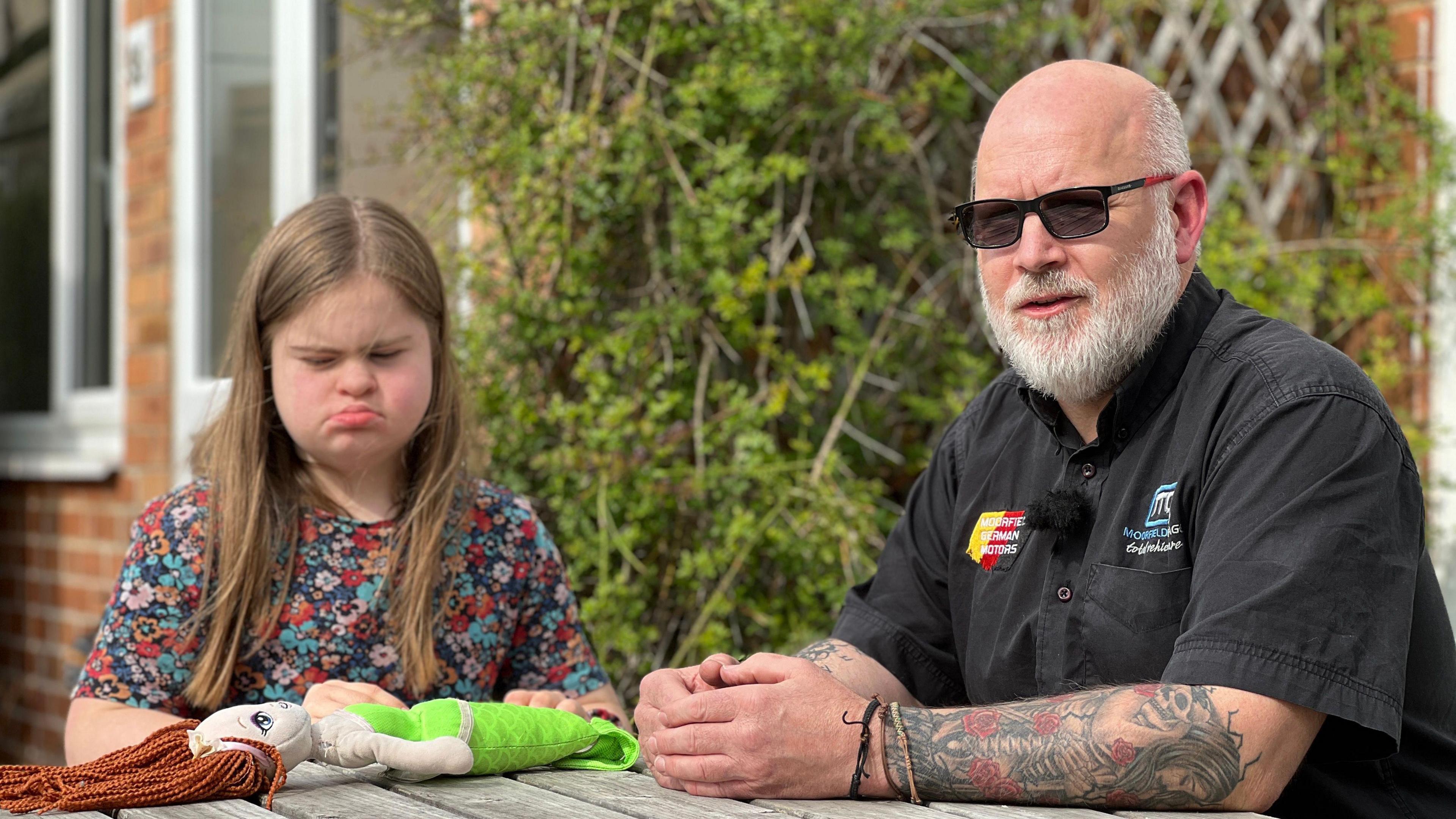'We've spent the summer trying to get school transport'

Richard said his summer had been "consumed" by trying to secure transport for his daughter, who has Down's syndrome and autism
- Published
Parents of children with special educational needs and disabilities (SEND) have said their summer has been "consumed" by trying to arrange school transport for the new term.
Earlier this year, Leeds City Council announced that SEND students aged over 16 would no longer be provided with a free school transport after the authority decided to cut the service to save £800,000.
Some pupils have instead been awarded a personal travel allowance or a bus pass, but other parents said they may have to cut their working hours to drive their children to school or college.
Councillor Helen Hayden, who oversees children's services in the city, said it was a "decision no-one wanted to make" but the service was not sustainable at its current level.
Richard is a single father who looks after his daughter Poppy, 16.
She has Down's syndrome, autism and complex learning needs, and for the past five years Leeds City Council has provided transport from their home in Otley to John Jamieson, a specialist inclusive learning centre in east Leeds.
This support has meant he could work full-time to provide for his family.
In June, following the local authority's decision to only provide home to school transport to young people with SEND in "exceptional circumstances", Poppy's case was assessed.
Leeds City Council offered to provide some financial assistance but Richard said it meant he would still have to drive her himself.
"It would mean I would get to work at 10:00 and have to leave at 14:30, which would impact the family - and the business I work for, it just isn't viable and has consequences."
He has appealed against the decision but does not believe he will get an answer until after schools go back in September, which means he will have to drive Poppy and "catch up on work in the evening, which will impact on my life".
Richard believes the council's policy is "hurting lots of people", adding: "Instead of spending the summer holidays with our children, we're having to spend the holiday trying to find out if we'll get transport to school in September."

Rachel Ashton said the decision to remove post-16 transport for young people with SEND means her daughter won't be able to start school in September
Rachel Ashton has found herself in a similar situation. Her daughter Bella has learning difficulties, autism and the learning age of a five-year-old.
Bella has had a place on council transport from her home in Horsforth to Boston Spa since she was 11 and her parents have paid a contribution of £300 a month as well.
However, now she is 16 the family have been told she is "no longer eligible".
Ms Ashton said that because she and her husband both work, they can't drive her there themselves, and she can't give up her job because the family need her income.
She added: "She can't do a journey alone, she will need an escort and the quotes we have for an escort are £25,000 a year, which is not sustainable".
The family have already appealed Leeds City Council's decision once, but it was rejected and they are preparing a second appeal.
Ms Ashton said: "This means Bella will not be able to start her post-16 education in September, so she will be out of education."

Ailith is part of a campaign group urging the council to reverse their decision
According to campaign group Save Our School Transport, more than 1,000 children will be affected by the policy changes.
Ailith Harley-Roberts is part of the campaign group hoping to reverse the authority's decision. Her daughter has also turned 16.
Ms Harley-Roberts is the service manager for Sunshine and Smiles, a Down's syndrome support network in Leeds. She accepts that helping children to travel independently is "fantastic" for students who are able to, but for a "large number of young people it is just not viable".
She said a number of parents who are part of the campaign are in a similar position to Richard and may have to cut the number of hours they work.
Ms Harley-Roberts cited the statutory guidance around transport and said the "transport provided has to be reasonable and take into account all relevant matters".
She added that some parents in the group believed the alternatives offered to them were not reasonable.
A review is due in the autumn on how the policy is impacting families, but she feared this was "too little too late".
Hayden, the council's executive member for children and families, said continuing to offer "discretionary" transport for over-16s was no longer financially viable.
She added that the policy was being implemented based on the needs of children, rather than the ability of parents to take them to their educational setting.
She said that there was no definitive list of the "exceptional circumstances" that would entitle families to continue receiving travel assistance as the council wanted to keep the criteria "as flexible as possible".
Hayden also explained that the appeals process was paused in July because the authority had made some changes to it.
Get in touch
Tell us which stories we should cover in Yorkshire
Listen to highlights from West Yorkshire on BBC Sounds, catch up with the latest episode of Look North or tell us a story you think we should be covering here, external.
Related topics
- Published16 October 2024
